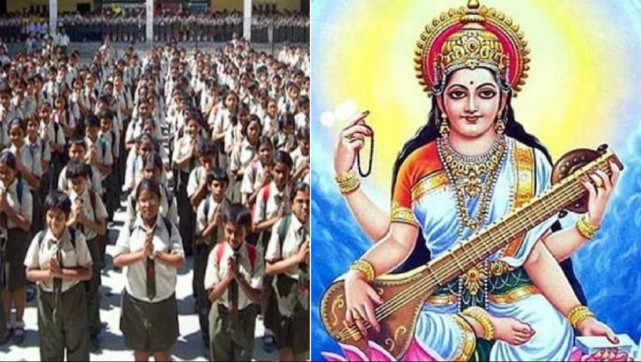

An increasing phenomenon today is that certain fanatic groups barge into Catholic institutions either with the demands of saffronisation of the day-to-day activities or with concocted allegations. It is a bitter pill to swallow. This is happening not only in the northern and northeastern states but also in southern India. It is high time to analyse the inducements for such allegations and implement remedial measures; otherwise, the day will not be far when we have to close down even if the Constitution of India grants rights to minorities to establish and administer such institutions.
The chief rationale is the lack of uniformity and unanimity in the functioning of such institutions, even though specified guidelines and directives exist. Recently, the Chhattisgarh government issued a mandate to celebrate the 'Guru Purnima Day' in educational institutions. It demanded that morning assemblies be organised in all educational institutions with "saraswati vandana" and other programs. In a particular town, a few Catholic schools celebrated and honoured teachers without veneration to 'Saraswati.' Still, two schools complied with all the paraphernalia as specified, like garlanding and venerating the photo of 'Saraswati', etc. Even teachers of other religions criticised the demeanour of the management as they had never witnessed such things in the past, and it did not sit right with them.
Everyone knows how some of the schools in Assam reacted when a particular group demanded the removal of statues of Jesus, Mother Mary, Saints, etc, as well as to avoid the use of religious habits by priests and nuns. A few schools the particular group had not approached also immediately removed the statues from the campus and building. The staff and students were perplexed by the statues of Jesus and Mary missing on a fine morning, which had been there for over thirty or even fifty years. Notably, statues were reinstalled at the demands of teachers and students in many places. It is agonising and alarming that many of us compromise our values and religiosity due to fear and convictions.
Such dichotomy in the functioning of our institutions in the same locality will naturally boost fanatic groups to get into our establishments with their agenda and will lead to disaster. Thus, there must be uniformity in running Catholic institutions and addressing such demands. Each diocese must talk about such matters and promptly frame proper guidelines per government policies rather than live life afraid of one's own shadow. Also, a collective mechanism to tackle the bone of contention rather than leaving it as a matter of particular organisations or persons is a fundamental necessity.
To deter wackadoo elements from vandalising institutions and bringing up bigoted and intemperate demands and actions, we need to stand upright with moral and religious certainty. Out of unawareness and inexperience, most of our people in such institutes are split on the relevance or need of reading the Holy Bible in the morning assembly. It is a point of contention for many today. Some posit reading scriptures of other religions and practising their faith in our institutions, etc.
The Constitution of the Nation specifically and categorically enables minorities to run institutions particular to their faith. It, however, does not give us the authority to criticise or desecrate aspects of other religions. What is significant is to conscientise the staff, students, and the general public that the management does not conduct any worship in the school and only begins the day's activities by invoking God's blessings.
Worship must be done in Churches, Temples, Mosques, etc., not in institutions meant for study and learning. Every religion teaches to take the name of God in reverence and respect, not to frighten others. The name of God is not a slogan to utter anywhere without reverence and piety. Value education classes should be aligned to teach such realities rather than cram some texts without any values.
It is time for the persons engaged in this area to have a clear idea and be ready to face challenges rather than compromise when issues arise, particularly concerning one's values and principles.
Ownership vs Possession
To some extent, we are totally entitled and enjoy owning our land and establishments. The query to be raised and further evaluated when we are in a realm of fear and anxiety in running our institutions is, do we really possess such land and institutions? The land may be legally in our ownership either by purchase or by lease. But do we become owners in the absolute sense? The owner of the land is God, and we hold it for specific missions and for a short period. So, the property and organisation must function with God's will; otherwise, unscrupulous elements will surely get into it. What is required is to give space to God in our land and institutions and let go and let God.
A bird's eye view of the current situation clearly specifies that possession of land and buildings is not in one's favour, irrespective of the legal ownership. Any property may have been owned by different people and used for various purposes previously. In philosophy, the 'principle of being' explains that the words and deeds remain as 'being' for eternity. Thus, the life lived – words and deeds - affect the present. To get out of this, we must 'possess' the land rather than own it. The anointing we receive entitles us to this ultimate possession, which we safeguard by keeping away all sinful and corrupted deeds from the campus.
Educating the young is a mission from God, specially commissioned on chosen ones, as the Church teaches, so the land and buildings should not be utilised for other activities. Only then will we have ultimate possession, and no one will enter to cause damage. Certain practical tips I can suggest to you to enjoy ultimate possession:
• Keep the statue or photo of Jesus, Mary and the Patron of the school in prominent places.
• Place crucifixes in all the rooms and verandas.
• Play the word of God (preaching of the word) and devotional songs through the PA system every day for a few hours before or after school hours to fill the air with God's presence and surrender to His presence.
• Recite the Rosary every day in procession in the building and campus.
• Celebrate Holy Mass at least once a month in the institution outside school hours.
• Teach the life principles of the school patron to the students.
• Conduct occasional blessings on the land and building.
Professionalism vs Religiosity
Catholic institutions and personnel have become more 'professional' in the last decade. They are a dime a dozen. What is expected of our people and institutions is skilful judgement and behaviour according to one's faith and beliefs. Professionalism focuses on achievements even at the risk of crossing the borders of one's faith and values. Because of this, stress and struggles increase in the institution and locality, further backing us against the wall.
There are opinions that the institutions must keep their distance from faith and conform to the contemporary society where competence and achievements are highlighted. This sounds like nothing but a recipe for disaster. At the same time, we should not forget the teachings of the Church, by which we have the sole ex
Thus, an educated guess would suggest that religiosity must be restored in our institutions without any delay, or the issues mentioned will increase daily. Our faith must be the source of strength and motivation behind all our worldly endeavours. We are responsible for creatively reflecting on how we can 'be' our complete selves (including our religious selves) at work. Remember the words, "You cannot serve two masters."
Of course, there is no accounting for taste in the current scenario, but to nip this trend in the bud, dare to become a religious professionally. I am sure it is a heavy cross to bear. However, there is no way out but to rise to the occasion. A few points are mentioned to set the wheels in motion.
• Catholic institutions should adopt the genuine vision that education is a ministry of evangelisation, not a means of drawing revenue, as is the perceived case with many of today's institutions.
• The fee we collect should justify the facilities provided for the all-round development of the students.
• Capitation fees and mandatory donations for admissions and faculty appointments must be abolished immediately.
• Pay the salary as per government norms.
• Using the annual surplus income from urban institutions, provide qualitative facilities to the underprivileged and marginalised, especially in rural areas.
• Frame policies for all stakeholders in tune with the vision and mission and ensure strict implementation.
• Spread the institution's mission and vision locally through social welfare programmes, raise social issues to the forefront, collaborate with district and state administration, various NGOs, etc.
• Provide free education to financially weak students and motivate economically well-positioned parents to sponsor the needy and deserving ones.
• Implement scholarship programmes for deserving candidates.
• Exhibit Christian values in prominent places at school through paintings, quotes, stickers, etc.
• Inspire to achieve life's purpose, not to drive with an ambitious purpose.
This wake-up call must strike true, or our very existence will be jeopardised. We are invited to jump in at the deep end to safeguard the very nature of our organisations in true faith and allegiance to the teachings of the Church and the law of the land. The injustice done must lead to a collective response. Fanatic elements always pull a fast one on us, so let us get a word in edgewise, always to sustain our rights.